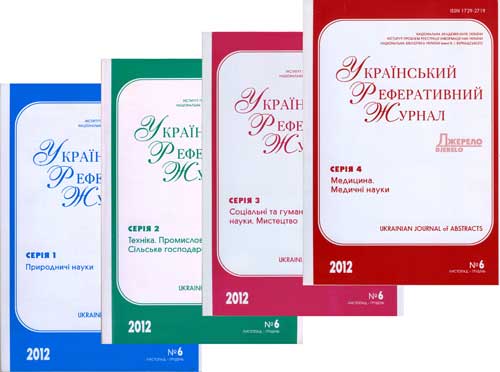РЕФЕРАТИВНА БАЗА ДАНИХ "УКРАЇНІКА НАУКОВА"
Abstract database «Ukrainica Scientific»
Бази даних
Реферативна база даних - результати пошуку
|
|
Пошуковий запит: (<.>ID=REF-0000746278<.>) | |||
|
Загальна кількість знайдених документів : 1 |
|||
Яремчук О. З. Вплив аміногуанідину на вміст гліального фібрилярного кислого протеїну у мозочку при експериментальному антифосфоліпідному синдромі на фоні вагітності / О. З. Яремчук, К. А. Посохова, М. М. Гузик // Експерим. та клініч. фізіологія і біохімія. - 2020. - № 1. - С. 36-43. - Бібліогр.: 28 назв. - укp. Antiphospholipid syndrome (APS) is an autoimmune disease that is characterized by arterial or venous thrombosis, thrombocytopenia. APS is one of the autoimmune causes of pregnancy miscarriages. According to the World Health Organization, the incidence of pregnancy miscarriages in the world is 15 - 25 %. Habitual miscarriage is a multifactorial, genetically determined disease. In 50 % of cases of habitual miscarriage the establishment of its cause is not possible. About 80 % of unexplained reproductive losses are due to immunological disorders. The pathogenetic mechanisms of pregnancy loss mediated by antiphospholipid antibodies (aPL) are thrombosis, placental dysfunction and local inflammation. The nitric oxide system is one of the significant links in the mechanisms of APS development. The effect of selective inhibitor of aminoguanidine inducible NO synthase on the content of glial fibrillary acidic protein (GFAP) and the level of nitric oxide (NO) synthesis in the cerebellum in cases of APS in the pregnant BALB/c mice have been studied. The experimental animals were divided into 5 groups: the 1<^>st Індекс рубрикатора НБУВ: Р716.216 Рубрики: Шифр НБУВ: Ж16160 Пошук видання у каталогах НБУВ Додаткова інформація про автора(ів) публікації: (cписок формується автоматично, до списку можуть бути включені персоналії з подібними іменами або однофамільці)
| |||
| Національна бібліотека України імені В. І. Вернадського |
 |
| Відділ наукового формування національних реферативних ресурсів |
 |
| Інститут проблем реєстрації інформації НАН України |
Всі права захищені © Національна бібліотека України імені В. І. Вернадського